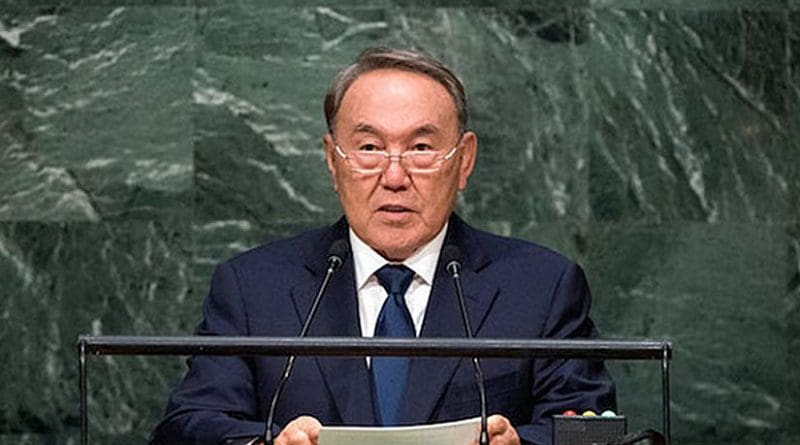Kazakhstan: President Nazarbaev Resigns, But Is He Really Leaving? – Analysis
By RFE RL
By Pete Baumgartner
(RFE/RL) — Having ruled Kazakhstan with an authoritarian grip since the 1980s, President Nursultan Nazarbaev shocked many when he unexpectedly announced his resignation on March 19.
“This year marks the 30th anniversary of my term as the supreme leader of our country,” Nazarbaev said during a hastily arranged nationwide address. “[But] I have made the difficult decision to resign as president of the Republic of Kazakhstan.”
Nazarbaev is credited by many with turning Kazakhstan — the world’s ninth largest country — into an energy powerhouse during his long reign, but strongly criticized for trampling upon democratic norms and freedoms while brutally suppressing all opposition to his rule.
“My generation and I have done everything we could for the country,” he said in the TV address. “The results are well known to you.”
Though leaving the presidential post, Nazarbaev will retain many other influential positions in the Kazakh government, leaving many to wonder if he’s really giving up power.
Still Holding The Reins?
Nazarbaev, 78, will continue to head Kazakhstan’s powerful Security Council, the ruling Nur Otan political party that he founded, and the country’s Constitutional Council.
The last Soviet-era president to leave office, Nazarbaev noted during his announcement that he was also granted the lifetime status of “Elbasy,” or “leader of the nation,” by parliament in 2010.
“So, I am staying with you,” Nazarbaev said. “The concerns of the country and the people remain my concerns.”
“He isn’t leaving the scene but when a new president is installed, he will lose some of his power,” Paul Goble, a longtime analyst of Russian and post-Soviet affairs, told RFE/RL. “I think we are in the midst of a transition that will likely take a year or more but that won’t have the discontinuities which might have occurred had he left by dying.”
Erica Marat, an associate professor at Washington’s National Defense University, thinks Nazarbaev’s presence will be felt in Kazakhstan for some time.
“He will remain a central political figure until the end of his days,” she told RFE/RL. “His cult is likely to live for decades as well, with future leaders building their legitimacy on the notion they continue building on the legacy of Nazarbaev.”
Nazarbaev announced that veteran politician and diplomat Qasym-Zhomart Toqaev, currently the speaker of the Kazakh Senate, would take over presidential duties as of March 20 and serve until the scheduled presidential election in 2020.
As head of Nur Otan, Nazarbaev would likely select that party’s candidate for next year’s presidential election.
And his position as head of the Security Council, which he noted in his resignation address has “serious authority,” would allow him to control the country’s foreign policy.
Timing Is Everything
Nazarbaev’s resignation comes just two days before Norouz, the springtime new year’s holiday that is celebrated in many predominantly Muslim countries.
The timing could be seen by many as symbolic of a new beginning and give people in Kazakhstan time over the holiday to discuss and digest the big political change taking place in their country.
While certainly a surprise announcement for many Kazakhs, others saw it coming.
“It was both long anticipated and an abrupt change at the same time,”
Marat said. “Nazarbaev has been considering various options for power
transition and has chosen one that will allow him to oversee the
succession process and normalize the idea that Kazakhstan can also be
ruled by a leader other than himself.”
The longtime leader had shown his hand about resigning, Goble said.
“Nazarbaev signaled that he wanted to resign by asking Kazakhstan’s
highest court to clarify the conditions under which a president could
leave office,” he said. “He clearly wants to leave but to manage the
transition to a new generation rather than serving until his death with
unpredictable consequences thereafter.”

